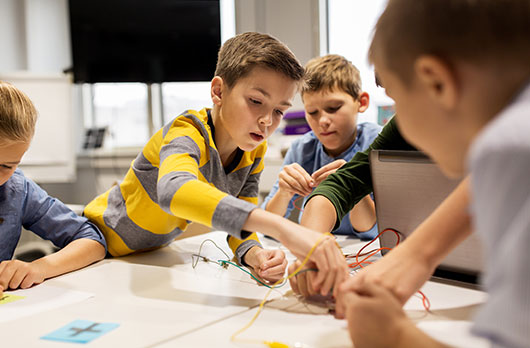Robots in Science
Researching the integration of robotics into middle school physical science courses: Examining instructional and learning outcomes
Lead Staff:
Debra BernsteinMichael Cassidy
Karen Mutch-Jones
Non-TERC StaffKristen Wendell, Associate Professor, Mechanical Engineering, Tufts University
Jennifer Cross, Research Assistant Professor, Tufts University
SummaryRobotic technologies provide innovative ways of engaging students in computational thinking (CT) practices within STEM fields, but teachers may be reluctant to use robotics if they do not feel confident with the technology, or when they feel unprepared to make the technology relevant to their subject areas. This project responds to such reluctance by designing, testing, and refining a professional development program for middle school physical science teachers to:
- develop and strengthen skills in robotics, programming, and identifying ways of using robotics to enhance the teaching and learning of physical science concepts, and
- design integrated curriculum units that advance student CT skills and support learning in the physical sciences.
The project will develop a comprehensive professional learning experience for middle school teachers who will develop learning modules that integrate computational thinking with physical science. After the professional learning experience, teachers will be supported in revising an existing physical science unit to incorporate computational thinking and robotics using a Hummingbird Bit robotics kit.
The professional learning plan will begin with summer sessions where teachers examine physical science models and experiments that exist in their curriculum, explore the Hummingbird robotics kit, analyze their curriculum for existing CT practices, and develop a unit using Backwards Design to enhance student learning in physical science. During the academic year, teachers will implement their robotics and physical science unit. This experience will be followed by ongoing professional learning days where teachers discuss the successes and challenges of the implemented lessons.
Research ActivityOur mixed-methods research study will address the following questions:
1) How can a professional development intervention enable integration of robotics into physical science courses?
2) To what extent does teacher enactment reflect the goals and principles of the approach to integration, and what challenges do teachers face during enactment?
3) How does participation in integrated robotics lessons support student learning in the discipline?
4) What opportunities does participation in integrated robotics lessons provide for students to engage in computational thinking practices?
Kristen Wendell, Associate Professor, Mechanical Engineering, Tufts University
Jennifer Cross, Research Assistant Professor, Tufts University
Robotic technologies provide innovative ways of engaging students in computational thinking (CT) practices within STEM fields, but teachers may be reluctant to use robotics if they do not feel confident with the technology, or when they feel unprepared to make the technology relevant to their subject areas. This project responds to such reluctance by designing, testing, and refining a professional development program for middle school physical science teachers to:
- develop and strengthen skills in robotics, programming, and identifying ways of using robotics to enhance the teaching and learning of physical science concepts, and
- design integrated curriculum units that advance student CT skills and support learning in the physical sciences.
The project will develop a comprehensive professional learning experience for middle school teachers who will develop learning modules that integrate computational thinking with physical science. After the professional learning experience, teachers will be supported in revising an existing physical science unit to incorporate computational thinking and robotics using a Hummingbird Bit robotics kit.
The professional learning plan will begin with summer sessions where teachers examine physical science models and experiments that exist in their curriculum, explore the Hummingbird robotics kit, analyze their curriculum for existing CT practices, and develop a unit using Backwards Design to enhance student learning in physical science. During the academic year, teachers will implement their robotics and physical science unit. This experience will be followed by ongoing professional learning days where teachers discuss the successes and challenges of the implemented lessons.
Research ActivityOur mixed-methods research study will address the following questions:
1) How can a professional development intervention enable integration of robotics into physical science courses?
2) To what extent does teacher enactment reflect the goals and principles of the approach to integration, and what challenges do teachers face during enactment?
3) How does participation in integrated robotics lessons support student learning in the discipline?
4) What opportunities does participation in integrated robotics lessons provide for students to engage in computational thinking practices?
Our mixed-methods research study will address the following questions:
1) How can a professional development intervention enable integration of robotics into physical science courses?
2) To what extent does teacher enactment reflect the goals and principles of the approach to integration, and what challenges do teachers face during enactment?
3) How does participation in integrated robotics lessons support student learning in the discipline?
4) What opportunities does participation in integrated robotics lessons provide for students to engage in computational thinking practices?

Funder:
National Science Foundation
Award Number:
1932854
Center for Engineering Education and Outreach, Tufts University
Dates:10/2/2019 – 9/30/2022
Share This Page: